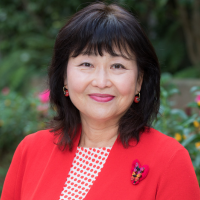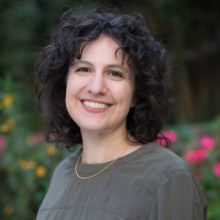
Strengthening Women's Health
The UCSF School of Nursing leads the way in research and education initiatives that are improving women’s lives.
Women’s health has largely taken a back seat when it comes to research and medical care. According to a 2021 report, in nearly three-quarters of the cases where a disease afflicts primarily one gender, National Institutes of Health funding favors men. If the disease affects more men, it’s overfunded. If it affects more women, it’s underfunded.
The UCSF School of Nursing is working to change that by finding new ways to innovate in raising awareness about health risks that predominantly impact women, expanding research and access to reproductive care, and collaborating globally on HIV prevention treatment programs to help women in need around the world.
Innovation in Women’s Health
Heart disease is the number one cause of death in women in the U.S., but awareness of its seriousness is relatively low, especially in younger women from racial and ethnic minority backgrounds. And it’s getting worse: women’s awareness and perceived risk of heart disease dropped from 65% to 44% from 2009 to 2019, with the steepest declines among Hispanic, African American and young women ages 25 to 34.

Yoshimi Fukuoka, PhD, RN, FAAN, professor, thought artificial intelligence (AI) might be a way to change that. Based on her experience as a critical care nurse, she had seen that heart disease awareness campaigns used a “one-size-fits-all approach, especially when targeting minority women,” she said. “We are not doing a good job at reaching out.”
To tailor campaigns, Fukuoka created HeartBot, a fully automated AI-powered chatbot that can educate and answer women’s questions about heart disease. HeartBot is available 24 hours per day and seven days per week. The initial pilot program was tested on a group of 171 women, two-thirds of whom were from diverse racial backgrounds. After a month, the participants’ knowledge of heart disease grew. Researchers found that African American and Hispanic women were more likely to ask questions and engage with HeartBot for longer periods of time, when compared to Asian and white women.
Fukuoka believes that the nature of a chatbot might make asking health questions easier for women who have had previous negative experiences with health care, and thus can help address inequities in care. “Some people prefer to talk to a bot because there is less risk of bias than when interacting with humans,” she said.
Commitment to Advancing Reproductive Health
At a time when access to reproductive health care is being curtailed around the U.S, the School of Nursing’s Abortion Care Training Incubator for Outstanding Nurse Scholars (ACTIONS) program is investing in nursing and midwifery leaders who are passionate about reproductive health and justice. The ACTIONS program provides pre- and postdoctoral fellowships, during which scholars receive mentorship in community-partnered research and policy to become educators and leaders in the field.
“There’s a lack of research and leadership capacity and scholarship by nurses, midwives and people in related disciplines,” said Linda Franck, PhD, RN, FAAN, professor and ACTIONS director. “This is especially problematic since nurses make up the largest part of the workforce in sexual and reproductive health care, but have been underrepresented in science and leadership in this area.” She sees ACTIONS as addressing root-cause educational gaps and advancing nursing and midwifery-led reproductive health research, as well as expanding abortion provision by nurses and midwives.

The ACTIONS program, founded in 2018, has grown beyond a fellowship and conducts research and creates policy change that supports the sexual and reproductive health workforce. For example, Renée Mehra, PhD, now an assistant professor at UCSF, co-led research on the facilitators and barriers of aspiring midwives of color during her ACTIONS postdoctoral fellowship. This research informed a California state bill to establish the Reproductive Health Service Corps (RHSC), which is creating new abortion care training programs and funding opportunities for nurses, midwives and other health professionals. ACTIONS graduate and alumna of the PhD in Nursing program Bethany Golden, PhD '24, CNM, co-directs the RHSC, and the ACTIONS program and the school’s primary care specialities are members of the RHSC Consortium.

The school also introduced a required course in the new BSN Entry to Doctor of Nursing Practice pathway which launched its inaugural cohort in summer 2024. Sexual and Reproductive Health Promotion provides an overview of prenatal and postpartum care, and some aspects of gynecological care for individuals assigned female at birth. Sarah Nathan, PhD, RN, FNP, associate professor who designed the course, said that this is a critical topic for students becoming family nurse practitioners because of the specific relationship that they have with patients across a range of ages. The course reframes the focus from sexual function and dysfunction to a focus on sexual health. The course also teaches students how to talk about sexual health from an equity standpoint, inclusive of the full spectrum of gender identity. “It gives our learners the skills to discuss reproductive health in a way that keeps the patient at the center of the interaction,” she said.
Demonstrate Global Leadership in Women’s Health Topics
While the school continues to have a great impact on the San Francisco community, faculty members are also working to improve women's lives worldwide. One such effort is a landmark collaboration among UCSF, UC Berkeley, Mzumbe University and the Ministry of Health in Tanzania to establish the Mwotaji Clinical Research Center and develop HIV interventions tailored for adolescent girls and young women in Tanzania.
The project is working to build capacity with local decision makers to get pre-exposure HIV medication and other sexual and reproductive health products in the hands of vulnerable young women, generally 15 to 24 years old, in Tanzania, where young women are disproportionately affected by HIV.
Adult HIV prevalence in Tanzania is estimated at 4.5 percent, with adolescent girls and young women accounting for 80 percent of all new HIV infections. “They suffer from the highest burden of HIV transmission right now in terms of new incidence, and are really underserved by the existing health system,” said Jenny Liu, PhD, MA, MPP, professor. “Not only are there structural barriers to accessing prevention measures at local clinical service delivery points, but they’re also socially and culturally disenfranchised and disempowered from accessing these services.”
This is especially critical right now as the HIV epidemic in Tanzania is at a turning point. “It was just starting to get over the hump and reach control, but that has remained elusive in recent years as systems were disrupted in the aftermath of COVID,” Liu said. “It’s time to rebuild those efforts, redouble down, and see if we can bend that curve again.”




